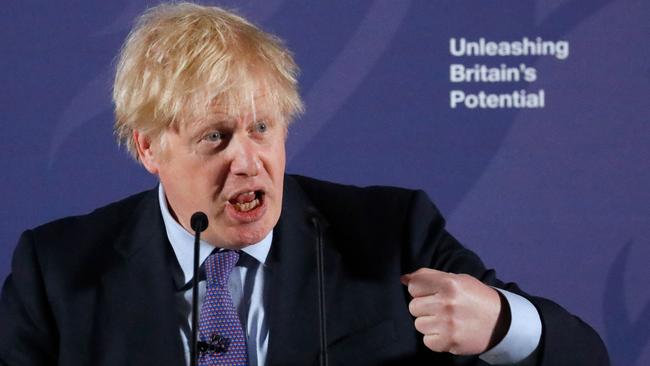Boris Johnson tells EU: we won’t accept your inferior rules
Boris Johnson has told the EU that Britain will not accept its laws and would be prepared to accept an ‘Australian-style’ trade deal.

Boris Johnson has told the EU that Britain will not accept its laws and would be prepared to accept an “Australian-style’’ agreement, effectively trading across the Channel operating on World Trade Organisation terms.
The British Prime Minister said that while the EU was insisting on the UK adopting all EU rules and regulations, the anxiety should be on the side of Britain because EU member states had inferior rules in many areas.
“We want a thriving trade and economic relationship with the EU, our historic friends, partners and neighbours,’’ Mr Johnson said. “At the outset, I say to our friends, I reassure you: we will not engage in some cutthroat race to the bottom. We are not leaving the EU to undermine European standards.’’
But Mr Johnson highlighted how France spent twice as much on state aid as Britain, and Germany three times as much. “Who is using subsidies to undercut? Not the UK,’’ he said.
Mr Johnson warned the EU that Britain was now an independent state and ridiculed the EU’s insistence that the Continent’s workers’ rights were gold standard. He said it was “absurd to suggest that British workers have been saved from Dickensian squalor by enlightened EU regulation, and it was only because of Brussels we don’t send children up chimneys’’.
He highlighted some areas of British rights, such as paid paternity and maternity leave, and issues such as banning ivory as areas where Britain was well ahead of the EU.
“I hope our friends understand there is no need for a UK free-trade agreement to accept EU rules … any more than the EU is obliged to accept the UK rules,” he said. “I hope you have got the message by now. We want a comprehensive free-trade agreement similar to Canada.
“The question is whether we agree a trading relationship comparable to Canada or more like Australia’s (trading arrangements, largely on WTO terms).
Just minutes before Mr Johnson’s speech, the EU insisted upon access to British fishing waters as its opening gambit to strike a UK trade deal.
EU chief negotiator Michel Barnier said an ambitious free market with zero tariffs was on offer, but insisted “it will not be business as usual’’.
In the opening pitch of what will be a drawn-out negotiating period before the deadline of the end of the year, Mr Barnier said the EU would withdraw the passporting rights of Britain’s financial services to operate in the EU.
Mr Barnier insisted that in any deal, Britain must agree to ensure a level playing field “to prevent unfair competitive advantages’’.
He added a crucial second condition, which is unpalatable to Downing Street: “It must include an agreement on fisheries to provide for continued EU practices to markets and waters.”
Mr Barnier also raised another politically sensitive point: that of equivalence for financial services. He said there would be no mutual recognition of rules.
“ For example, the UK financial services will no longer have passporting rights,” he said. “All imported goods and services will need to comply with EU rules on safety, health and other public policy objectives.’’




To join the conversation, please log in. Don't have an account? Register
Join the conversation, you are commenting as Logout